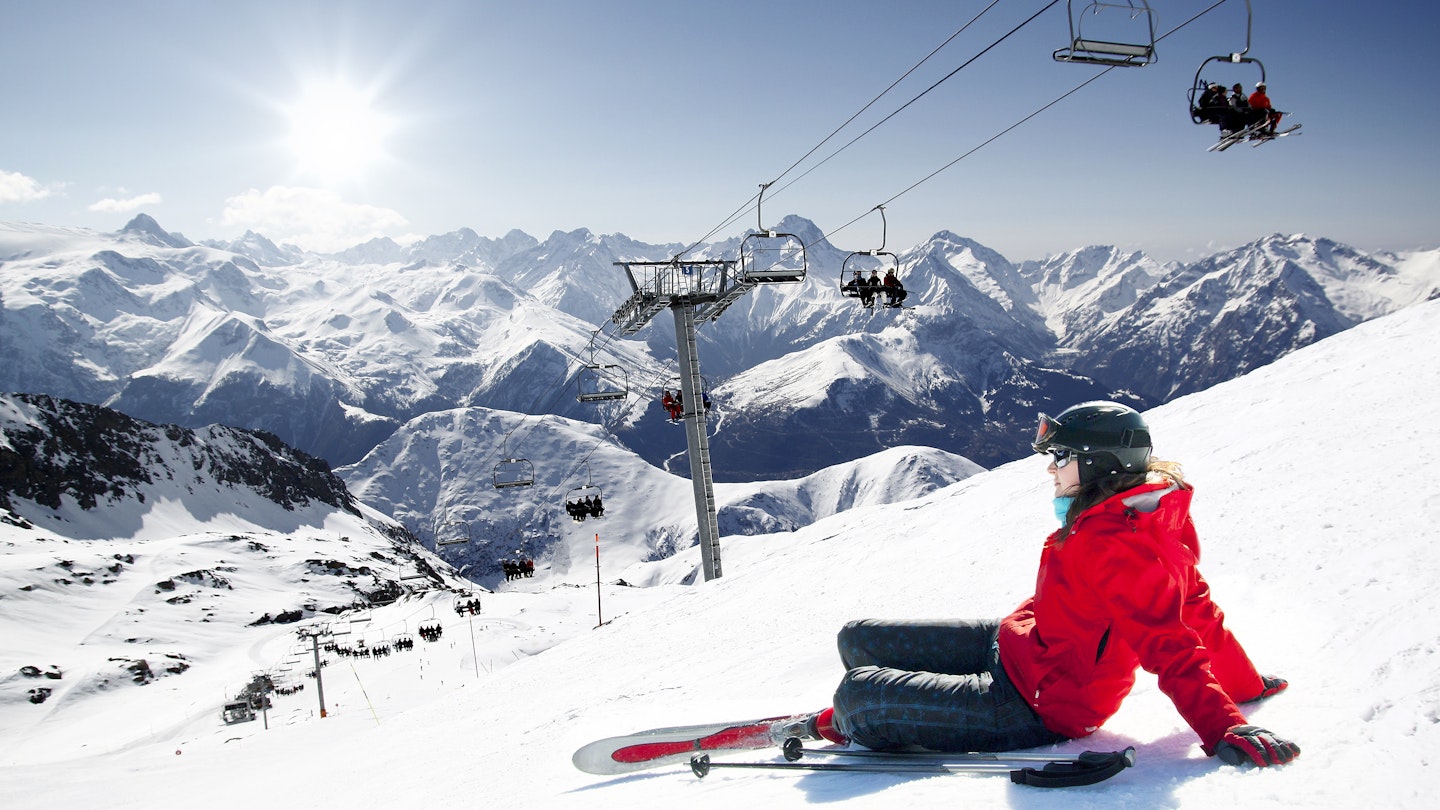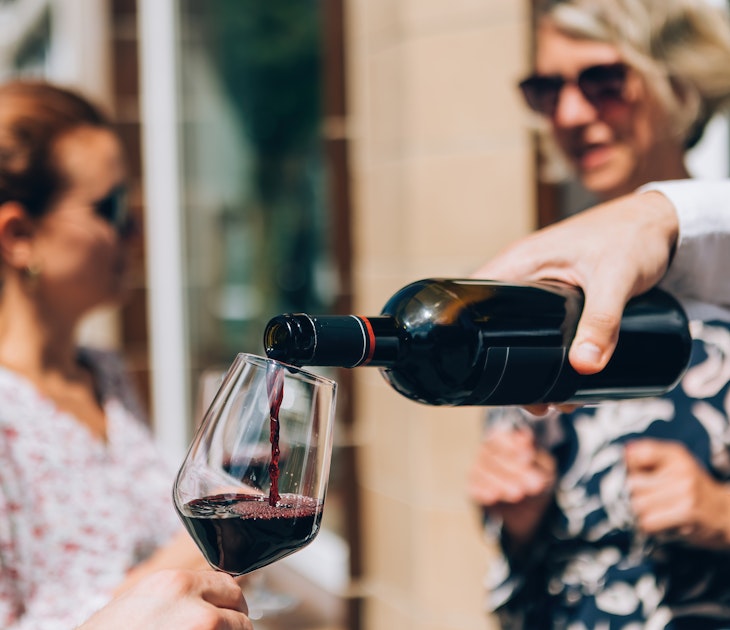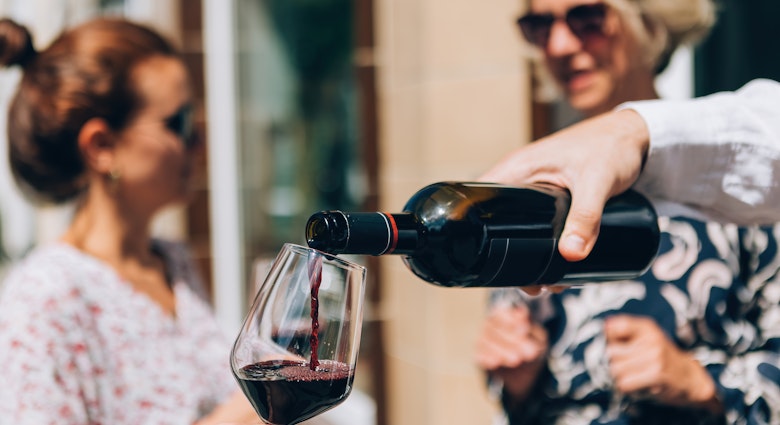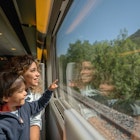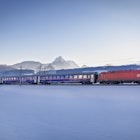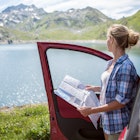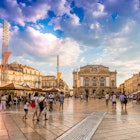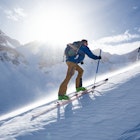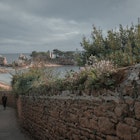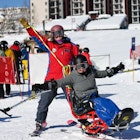Be it hammering down heart-thumping blacks in the ice-blue shadow of Mont Blanc, ski-touring beneath glistening saw-chiseled peaks or tree skiing through picture-book forests, France sports an unrivaled variety of skiing – for all abilities, styles and budgets.
The winter ski season in the blockbuster French Alps, quieter Pyrenees and low-key Jura Mountains typically runs from mid-December to April. The highest-altitude alpine resorts, such as Val Thorens (Europe’s highest, crowned World’s Best Ski Resort for the 8th time in 11 years at the 2023 World Ski Awards), Tignes and Les Deux Alpes, are the first to open in mid-to-late November, depending on snowfall. Limited downhill skiing on glaciers above 3,000m (9,842ft) in Tignes and Les Deux Alpes guarantees a corduroy fix for a few gold-dust weeks from mid-June until sometime in early August; each year, warmer temperatures and glacial melt shave more days off the already disconcertingly short summer ski season.
Christmas, New Year and February school holidays are peak season: expect sky-high transport and accommodation prices, packed bars and restaurants and queues for ski lifts. Book months in advance to bag your choice of place (old-world alpine hamlet, car-free village, purpose-built resort) and bolt-hole (mountain hut with bunks, family-run hotel, self-catering chalet, luxury cocoon with hot tub and soul-soaring, snowy-peak view).
To reduce carbon, train it to the French Alps and use public transport or local car-sharing services like BlaBlaCar or Morzine Co-Voiturage for the final leg from station to snow. From the UK, ride the overnight snow train TravelSki Express via Lille to Bourg St-Maurice; hop aboard the once-weekly Eurostar Snow Train to Lille and beyond to Chambéry, Albertville, Moûtiers, Brides-les-Bains, Aime-la-Plagne and Bourg-St-Maurice. Or simply pair a regular Eurostar train to Paris or Lille with SNCF TGVs and regional trains. For anyone contemplating trail travel to the Alps, Snowcarbon is the definitive rail planner.
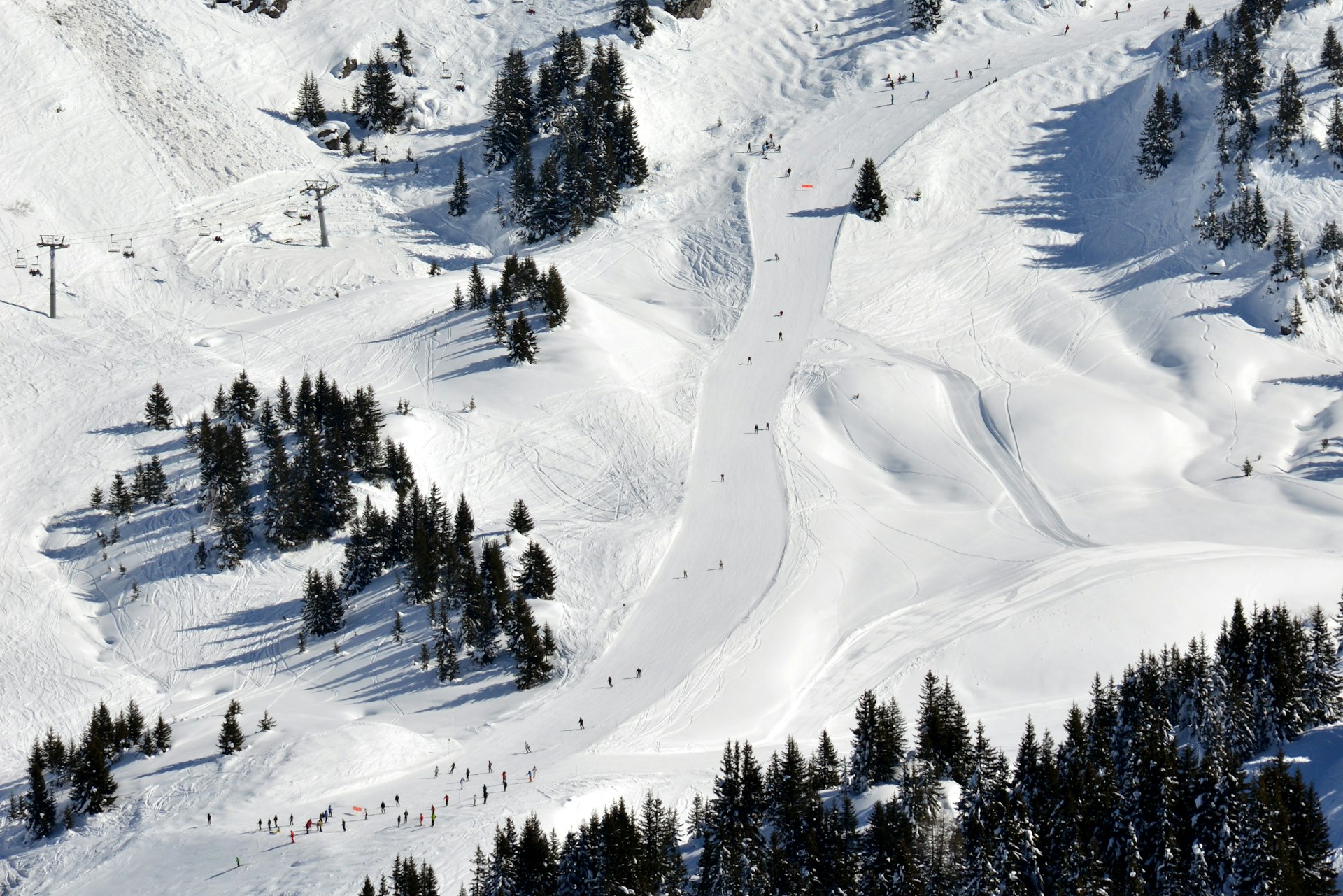
1. Morzine-Avoriaz
Best for eco riders
A resort’s ecological footprint is increasingly vital to skiers. Green-thinking Morzine-Avoriaz hits the spot with renewable energy-powered catered-chalet accommodation with Alikats (ingeniously, single room bookings in shared chalets are also available), electric-vehicle transfers and car-sharing, zero-waste initiatives and plant-based dining. Skiers can rent ski clothing in Morzine from Crevasse Clothing, savor artisan cuisine showcasing local produce at Avoriaz’s cool hotel-restaurant hangout MiL8, or tuck into mountain-foraged feasts cooked by private forager-chef Blossom & Weeds. Snow days open with zero-waste coffee roasted in the valley by Cafés Vorlaz and end guzzling craft beer with local eco-riders at Morzine’s experimental microbrewery Bec Jaune. Both resorts, accessible by train to Cluses or Geneva and then shared transfer, carry the Flocon Vert ("Green Snowflake") label, awarded for sustainable practice to 15 resorts in France.
Skiing for all levels in the family-friendly Portes du Soleil ski area (400km/249mi of runs) is sublime. Morzine is a party-loving market town stitched from traditional wooden chalets and slate-tiled roofs. Higher up the mountain at a snow-reliable 1,800m (5,906ft), ski-in-ski-out Avoriaz is a whimsical car-free cocktail of 1960s avant-garde architecture and snowy streets charmed with old-world, horse-drawn sleighs.
Getting to Morzine-Avoriaz: Geneva in neighboring Switzerland is the closest airport, a 90-minute drive. Altibus shuttle buses link Cluses train station with Morzine in 30 minutes; rail arrivals get a 10% discount on ski passes with the AlpinExpress Pass.
2. Megève
Best for glamor & gastronomy
A longstanding Chamonix Valley honeypot, this upmarket village resort with its baroque old town and a photogenic fleet of chichi horse-drawn carriages was dreamt up in the 1920s by alpine escape-seeking Baroness Noémie de Rothschild (of vintner and banking fame). It has been a hit with Parisians, gastronomes and well-heeled families ever since.
This is the only French ski resort to twinkle with three Michelin-starred gastronomic restaurants (top French chefs Emmanuel Renaut and Anne-Sophie Pic are both here) and winter reboots of St-Tropez’s iconic Le Café and the Parisian piano-cocktail bar Le Piaf.
Lunching on the slopes is memorable. Rustic chalets d’alpage, once used by summertime shepherds, pepper the resort’s family-friendly slopes in the Évasion Mont Blanc ski area. Some harbor atmospheric Savoyard eateries. Refueling on melted Comte on toast, tartiflette oozing gooey Reblochon cheese, and blueberry tart at Chalet Le Forestier or Auberge du Bonjournal are ski-holiday highlights. Ditto for a lunch to remember at the Alps’ oldest high-altitude restaurant from the 1930s, Chalet Sauvage, or après-ski with truffle pizza and oysters at L’Idéal 1850.
Getting to Megève: Book shared and private bus transfers from Geneva airport with Megevexpress. Buses link the resort with Sallanches train station, 7.5 miles (12km) south.
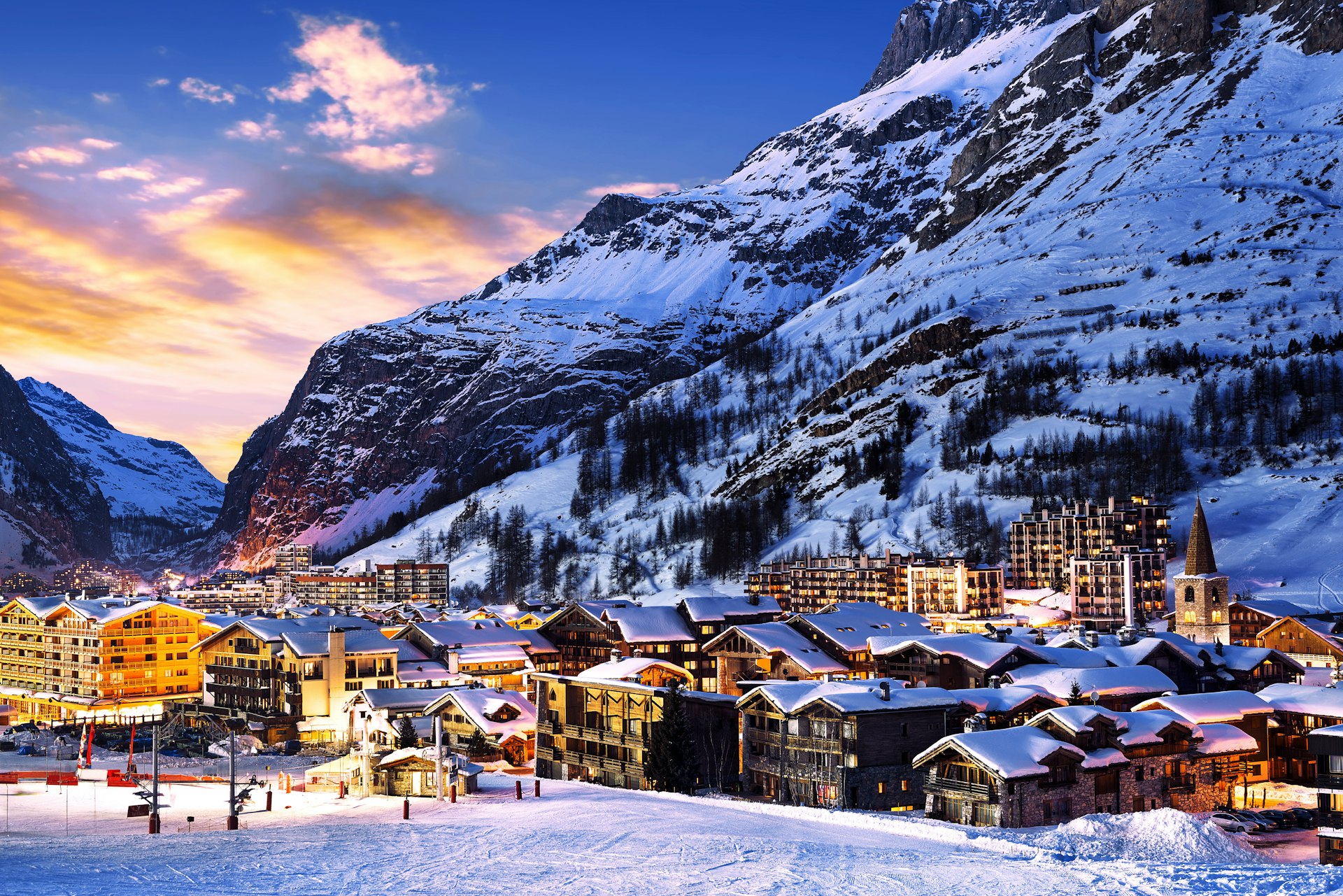
3. Espace Killy
Best for families (especially teens)
Gargantuan in size and variety, Espace Killy in the upper Tarentaise Valley is the dream all-rounder. From miles of jaw-dropping off-piste descents to green, beginner and tot-friendly baby slopes, this phenomenal ski area has your back – whatever your age or level. At its heart sit blockbuster resorts Val d’Isère and Tignes. Both require cash to splash but compensate with world-class facilities, the whole gamut of accommodation and dining, and brilliant nightlife: legendary Folie Douce has been the alfresco hotspot on the snow since 1982 to kick off the après-ski party with glitzy dancers on stage, DJs and rogue table dancing.
Lakeside Tignes is for adrenaline junkies. On frozen Lac de Tignes, younger children can play in a snow labyrinth and igloos, ice skate and try curling. Daredevil teens can fly down a ski jump and hurl themselves bungee-jump style into a 40m (131ft) void with Bun J Ride. Ice diving and ice floating are pretty cool, too.
Getting to Tignes: Count one hour by bus 83 from Bourg St-Maurice train station to Tignes; Transdev Savoie also operates bus shuttles to Geneva and Lyon airports.
4. St-Martin de Belleville
Best for a cute village vibe
With its pretty steepled church and cluster of traditional Savoyard houses, this Real McCoy village in the Tarentaise Valley is straight out of a beautifully illustrated storybook. Skiers spill out of bed and onto snowy slopes at 1,450m (4,757ft), linked by lifts to the snow-sure Trois Vallées – the world’s biggest ski area stitched from four valleys and 600km (373 miles) of slopes. Its seven resorts include Brit-loved Méribel, sky-high Val Thorens, family-friendly Les Menuires and A-lister Courchevel, where the super-rich hobnob. Skiing here is for all levels, although intermediates and above have an absolute blast. Back in low-key St-Martin de Belleville, a rustic plate of gut-busting diots (local pork sausages slow-cooked in white wine) and a sing-song with a traditional accordion player at old-school Le Trait d'Union is an evocative reminder that you’re still in rural Savoie.
Other pretty ski villages: Les Gets and St-Jean d’Aulps (Portes du Soleil); Lanslebourg-Mont Cenis, Lanslevillard and Bonneval in backcountry Val Cénis.
Getting to St-Martin de Belleville: From Moûtiers (the nearest train station), Transdev Savoie runs buses to all the Trois Vallées resorts. Altibus provides airport transfers.
5. Hirmentaz-Bellevaux
Best for budget skiers
Little-known Hirmentaz in Haute-Savoie’s Vallée Verte is one of the tiniest resorts, with 25 slopes and 15 lifts suitable for beginners and unambitious intermediates. A lower altitude of 1,100m (3,609ft) means snow can be patchy, and the season is short. But in terms of bang for your buck, budget skiers won’t ski for less – an adult one-day ski pass costs €25.60 (or €22.50/14.60 for five hours/from 3pm) compared to €67 for a day in nearby Chamonix (no half-day pass available).
Much loved by local families, young kids tumble out of the car and onto the slope. Sports shops renting ski gear are likewise snowball-throwing distance from the car park, and the crepes cooked up on the slope-facing terrace of Hôtel Les Skiers are surely the cheapest in the Alps. Bernex (forest trails in pine woods) and Thollon-les-Mémises (panoramic views of Lake Geneva) are other small, excellent-value resorts in the area.
Getting to Hirmentaz: You’ll need your own wheels to access Hirmentaz, an hour’s drive from Geneva airport. Or download the BlaBlaCar app and ride-share.
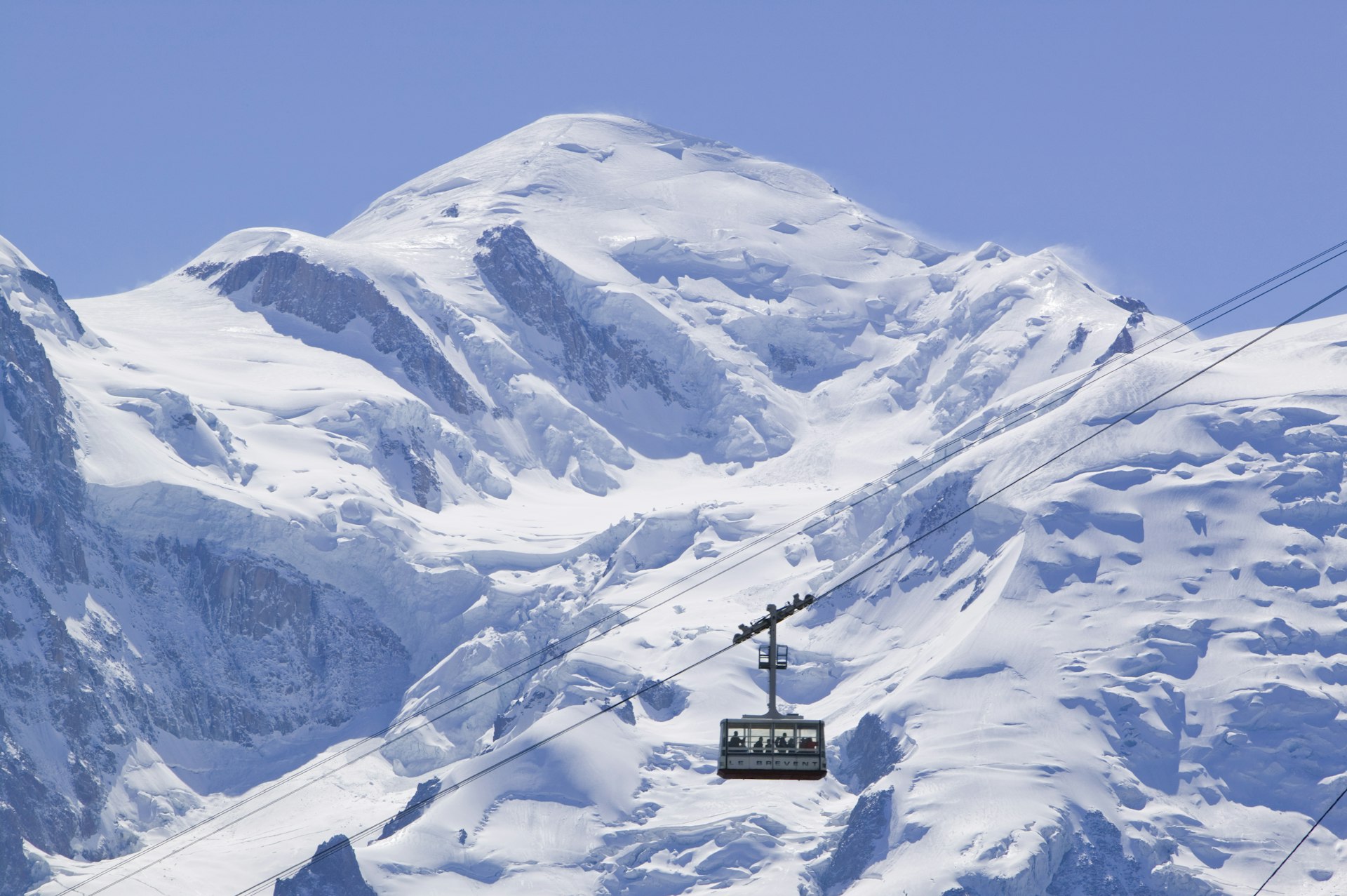
6. Chamonix
Best for advanced skiers
Propped up by a Herculean alpinist heritage and ski icons in spades, this historic town in Haute-Savoie’s Chamonix Valley is spectacular. Mountains loom large in every direction, climaxing with Mont Blanc (4,805m/15,766ft) – Europe’s highest peak – and Aiguille du Midi (3,842m/12,605ft), accessible year-round by cable car. From here, experienced skiers cruise across crevasse-chiseled glaciers with a guide on the 20km-long (12.4mi) Vallée Blanche descent, one of Europe’s most legendary off-piste runs.
Freeriders after big lines head to the steep, challenging slopes (many unabashed), moguls and gnarly pow of the Grands Montets ski area in Argentière and to white-knuckle blacks in Les Houches; the vertical Kandahar on the Verte des Houches piste is legendary. The sunny slopes of Brévent-Flégère are also excellent for advanced skiers. Pamper aching muscles post-ski with a glorious spa dip with a view at QC Terme.
Chamonix downtown is equally high octane. Drinking, dining and shopping opportunities abound. Don’t miss raclette and other local cheeses at the boutique of dairy cooperative Coopérative Fruitière en Val d’Arly (93 rue Whymper) and the best gauffres (waffles) in the Alps, cooked to order in a humble wooden street hut since 1965 at Gauffres de Chamonix (65 rue Whymper). Reserve a table for dinner a few doors down at cocktail-cool Mumma.
Getting to Chamonix: Trains link downtown Chamonix with destinations all over France. Private or shared bus transfer with Alpybus is the quickest way to/from Geneva Airport.
7. Alpe d’Huez
Best for festival junkies
Alpe d’Huez is famed for its snow-sure altitudes, abundant intermediate reds and one of Europe’s longest black runs – the almost vertical, 16km-long (10mi) La Sarenne (top tip: catch the sunset on the last run down of the day from the Pic Blanc cable car). The resort’s steep and sinuous 14km-long (8.7mi) access road with 21 hairpin bends is a frequent star in the Tour de France. But for festival lovers, the resort is about dancing to live house, techno and other electronic music performed by world-class artists on multiple indoor and outdoor stages – some at 3,300m – at the week-long Tomorrowland Winter Festival each March.
Other unmissable music fests in the snow: Snowboxx (Avoriaz), Rock the Pistes (Portes du Soleil) and Rise Festival (Les Deux Alpes).
Getting to Alpe d’Huez: Altibus provides bus transfers from Geneva airport. Unbeatable-value, return Skiligne day trips by coach from Grenoble bus station with Transaltitude start at €20, including a one-day lift pass.
8. Métabief Mont d’Or
Best for cross-country
Ski life unfolds at a slower, gentler rhythm in the sparsely populated Jura Mountains, which extend northeast along the Franco-Swiss border from Lake Geneva to Belfort. Cheese-making, cross-country skiing and melodic cowbells chart out the hours of the day, and little beats cruising at a steady pace along 214km (133 miles) of cross-country trails around Métabief Mont d’Or. One lift in the pastoral ski station whisks downhill skiers to the top of Mont d’Or (1,463m/4,800ft), from where serene views of Lake Geneva, the Matterhorn and Mont Blanc unfold on the horizon. Warm the cockles after with a fiery, après-ski shot of local liqueur de sapin (pine tree liqueur).
Other scenic cross-country resorts: Autrans in the Massif du Vercors (Isère); Domaine du Chioula, an hour’s drive from Toulouse (Ariège)
Getting to Métabief Mont d’Or: Your own wheels is the only way.

What to know before booking your French ski trip
Determine the ski level of your party and match it to the right station de ski. If rolling out of bed onto the slopes is your goal, go for a higher-altitude resort around 2,000m, where snow is pretty much guaranteed, and accommodation is predominantly ski-in-ski-out.
Accommodation and forfaits de ski (lift passes) will be your two biggest expenses. The further away ski digs are from ski lifts, the cheaper they tend to be. Ditto for ski passes, which cost less in smaller, lower-lying resorts. Across the board, reduce queue time and expenditure by buying/recharging reusable smartcard ski passes in advance online.
Save mega bucks on kit rental and be kind to the planet simultaneously: in the UK, rent or buy pre-owned gear from Ecoski before departure. Sports shops in resorts rent skis, boots and helmets; just reserve in advance online.
Skiing for free or on the cheap
With a one-/six-day lift pass costing anything from €25/137 (Hirmentaz–Bellevaux) to €75/375 (Courchevel, famously France’s most chichi resort), it can pay to ditch the lifts altogether and ski for free. Almost every downhill resort now has marked itineraries – usually insanely scenic – for ski de randonnée (ski touring). Sports shops rent touring gear.
Children under five ski downhill for free in most resorts, as do seniors over 72 or 75. Most resorts offer a 40% discounted one-day ski pass on Saturdays – even more of a steal, given Saturday (traditional "changeover day") is the quietest day of the week on the slopes.
And if you don’t ski?
It’s also cool. Resorts sell pedestrian passes for winter hikers wanting to ride a lift up to higher, more panoramic trails – to explore on foot or with snowshoes. Otherwise, the choice of outdoor spills to thrill on without setting foot on skis has never been so exciting: think ice diving, fat biking (essentially flying in the snow on a mountain bike), extreme sledding, ice climbing, zip lines, dog sledding with huskies, skydiving – there really are no limits.

